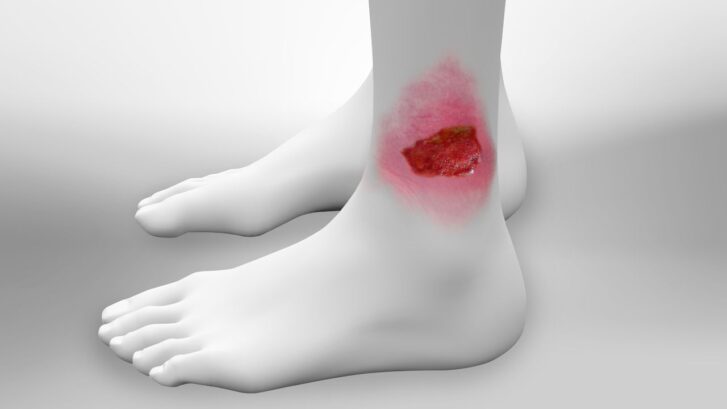Venous ulcers are kind of open sores that develop when the pressure inside the veins increases abnormally. This happens due to failure of leg veins to send the blood back to the heart and there occurs blood pooling with huge pressure in the limbs. The damaged venous valves can be the cause behind this condition. If this condition is left untreated, these leaky sores start damaging the veins and can land you up for the long-term hospitalisation.
Based on the patient’s medical history, thorough clinical examination and the appropriate investigations, the doctor will reach the final diagnosis of a condition called chronic venous insufficiency which is one of the major causes underlying venous ulcers. All this data helps the vascular surgeons to chart out an effective treatment plan for the same.
Signs And Symptoms of Venous Ulcers
For venous ulcerative conditions, clinical signs and symptoms determine the diagnosis. The first presentation of such sores is generally the wounds on the inner side of lower legs. These sores are non-healing in nature and show recurrent behaviours if the underlying cause is not treated.
The symptoms of such ulcerative condition include:
- Swelling and pain in the lower limbs
- Abnormal dilation of veins on the same limb
- Skin changes including over dryness, itching and pigmentation
- Oozing ulcers on the legs
Investigatory Procedures for Venous Ulcers
Various investigations that can aid in making diagnosis of this ulcerative disorder are:
- Venous Doppler/ Duplex scan to assess the blood flow status in the lower limbs
- Culture and sensitivity test for the oozing discharge from ulcers to plan the antibiotics for treatment
- X-ray to check for the range of invasion
- Biopsy to rule out cancerous activity in the area
- Other related routine blood investigations
Treatment methods for Venous Ulcers
As discussed earlier, such ulceration are the consequences of blood pooling. So, the prime stay of treatment will be treatment of underlying cause. Because when veins will start pushing the blood back, both the present ulcerations and their recurrence can be brought under control.
First, the infection needs to be taken care of. If the person is diabetic then antibiotics are prescribed along with diabetic medications. One should have optimum blood pressure and cholesterol levels to achieve best treatment results.
We can use” 4 ME ABCDE” mnemonic for describe the best treatment plan before proceeding for vascular surgery:
- 4 layered bandages for best compression maintaining the patient’s comfort
- Massage of the dilated venous area and calf muscles
- Elevation of the affected limb for about half an hour and around 3-4 times a day
- Antibiotics to treat the infected ulcers
- Bandages
- Care of ulcer: clean wounds heal better and faster. So, one must regularly clean them using normal saline.
- Dressing with prescribed ointment
- Exercise for better circulation, joint mobility and calf muscle strengthening
As soon as ulcers start showing healthy healing signs of healing, the doctor may proceed for skin graft if needed. One must choose his/her health care professional wisely to undergo such sophisticated procedures. Indian Vascular Surgery Centre is India’s leading vascular surgery clinic that ensures your best recovery from venous ulcers using advanced technologies along with highly skilled vascular surgeons.


